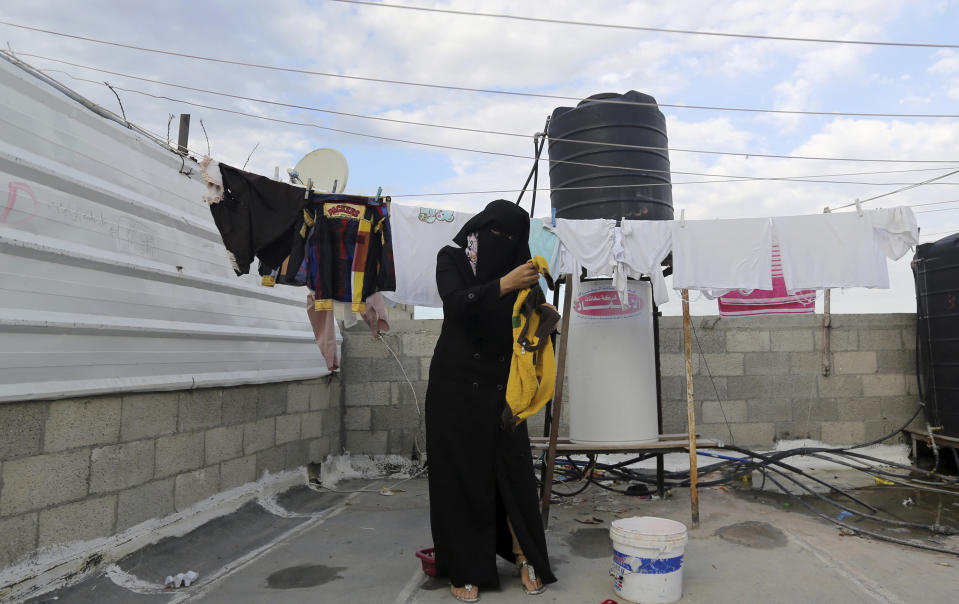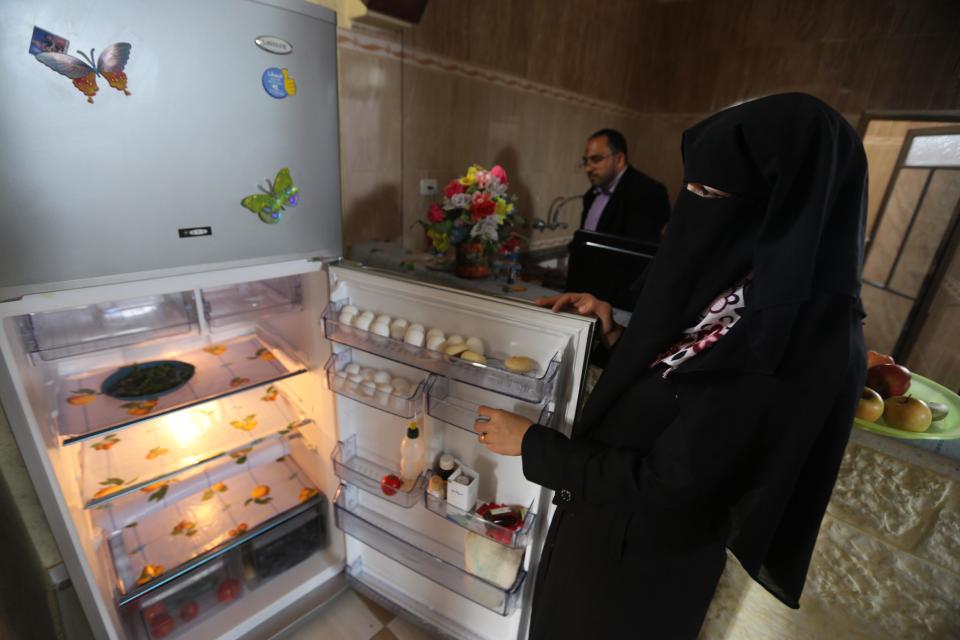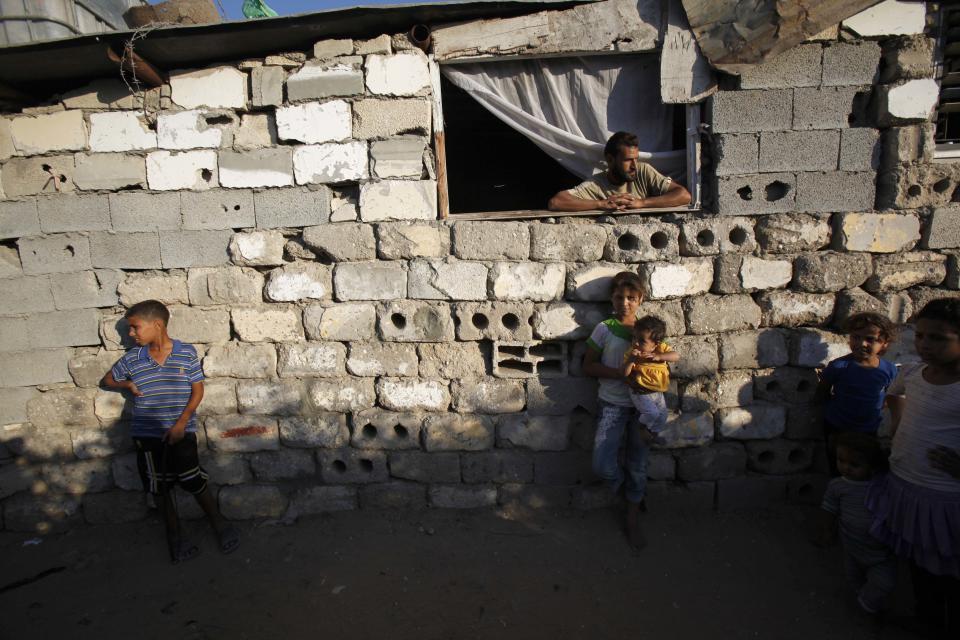Hamas in worst cash crisis since seizing Gaza
GAZA CITY, Gaza Strip (AP) — Gaza's Hamas rulers have been hit by the worst economic crisis since seizing the territory seven years ago and face growing discontent, even among core supporters, because there's no sign of relief from a blockade enforced not only by Israel but also by a suddenly hostile Egypt.
Hamas government employees have complained publicly about getting only partial salaries for the past four months. Bus drivers have staged a strike over soaring fuel prices. Laborers have lost jobs as construction has dried up. Hamas' own surveys show its popularity plummeting.
"I never experienced a situation worse than this one," said Ahmed Zeitouniya, 32, who has been walking to his job in the Culture Ministry because he can no longer afford $1 in bus fares and is in debt to the neighborhood grocery and his oldest son's kindergarten.
Gaza's isolation is unlikely to ease soon. Instead, Israel and Egypt have tightened their border closures.
Israel sealed its only cargo crossing with Gaza on Wednesday after the Islamic Jihad group fired dozens of rockets from the territory at Israel. Hamas seems to tolerate occasional Islamic Jihad attacks on Israel as a release valve for the public's discontent. However, Hamas has largely observed a truce with Israel since heavy fighting 2012 and does not seem interested in further escalation.
The game changer for Hamas was the Egyptian military's ouster last July of then-President Mohammed Morsi. The military-backed government in Cairo has since banned Morsi's Muslim Brotherhood — the region-wide movement that also spawned Hamas — and has shut down most of the smuggling tunnels along the Gaza border, which were an economic lifeline for the strip.
The Hamas government lost nearly two-thirds of its revenue as a result, said Omar Shaban, a Gaza economist. With the tunnels, Hamas earned about $500 million a year — of an annual budget of just under $900 million — in taxes on the Egyptian imports, said Shaban.
Cheap fuel, cement and other supplies from Egypt also powered Gaza's economy, particularly the local construction industry which employed several tens of thousands.
Now the government is no longer able to pay full wages to 51,000 civil servants and members of the security forces. In recent months, government employees have received only partial payments.
Some Hamas officials say new revenues can be found, including by heftier taxation of large companies. But the economy is boxed in: Israel, which considers Hamas a terrorist group, controls Gaza's airspace, blockades it by sea, and heavily restricts movement of people and goods by land.
For the first time in years, there is even a ripple of speculation that Hamas might be driven from power by the growing difficulties of running a government.
A semi-regular internal poll carried out by Hamas in December showed that support for the group had dropped to 29 percent, down from 55 percent from late 2012. The poll of 3,000 respondents in Gaza had a margin of error of 1.5 percent.
But many believe the Islamic militant movement will keep its grip because there's no one on the ground to take its place.
Hamas' main political rival, the Fatah party of West Bank-based Palestinian President Mahmoud Abbas, is weak here and split in Gaza among Abbas supporters and those backing his former protege, Gaza-born Mohammed Dahlan, who has lived in exile in recent years.
Many Gazans will stand by Hamas at any price. The movement has deep roots in religiously conservative Gaza and runs clinics and kindergartens it established during years underground when Fatah controlled Gaza.
Others are too afraid to express their frustration.
Hamas, with a force of more than 15,000 armed men, has tended to move swiftly to snuff out unrest.
Last month, when taxi and bus drivers staged a one-day strike over rising fuel costs, they were detained for several hours by Hamas security and only released after signing pledges not to strike again, said driver Wissam Abu Lehiyeh, 41.
"The first day we called for the strike, some people called us collaborators" with Egypt and Israel, said Abu Lehiyeh.
But Hamas also made a concession to the drivers, allowing them to raise fare prices by a few cents. With smuggled Egyptian fuel no longer coming in, motorists now pay triple for legally imported Israeli diesel and gas.
Just a year ago, Hamas' prospects seemed much brighter: The Brotherhood had risen to power through elections in Egypt, and Hamas enjoyed improved ties with regional powers Qatar and Turkey. The coup in Egypt last summer dramatically reversed Hamas' fortune.
Ahmed Yousef, an intellectual from Hamas' pragmatic wing, warned the status quo in Gaza is unsustainable. "It is no longer possible for the government institutions ... to stop the continued decline in all walks of life," Yousef wrote in an essay sent to journalists on Wednesday.
Without the Egyptian fuel, Gaza's longstanding electricity shortages have gotten even worse. On good days, power is on for eight hours and off for eight, but the rolling blackouts change to six hours on and 12 hours off when the territory's only power plant runs out of fuel, as it has done repeatedly in recent months. At the same time, many in Gaza can no longer afford to run generators.
"We are back to using candles," said Abu Ibrahim, a 40-year-old captain in the traffic police who has received less than one-third of his salary since December. He spoke on condition he be identified only by his nickname for fear of trouble with Hamas officials.
Traffic is unusually light. Some shopkeepers say they've begun turning away customers asking to buy on credit because the merchants also face rising debt.
Among the hardest hit are Gaza's thousands of unskilled laborers who lost their jobs after construction sites shut down and get only sporadic welfare payments.
In a twist of fate, tens of thousands of former civil servants in Gaza who left their jobs after the Hamas takeover continue to receive salaries from Abbas' self-rule government in the West Bank.
There's no sign so far that Hamas is trying harder to reach a power-sharing deal with Abbas, which would require painful concessions.
For now, Hamas appears to be just trying to manage the crisis in hopes the regional constellation will one day change.
For the West, a collapse of the Hamas government would ostensibly come as a relief.
The U.S. and Europe view Hamas as an obstacle to any Israeli-Palestinian deal on setting up a Palestinian state on lands Israel captured in 1967. U.S. Secretary of State John Kerry, who has been trying for the past seven months to broker such an agreement, never spelled out how a Hamas-ruled Gaza could become part of such a state.
However, European diplomats assessed in their recent annual mission report that neither Israel nor Egypt "is interested in a total collapse of Hamas at present as this would leave a potentially dangerous power vacuum" in Gaza.
___
Associated Press writer Mohammed Daraghmeh in Ramallah, West Bank contributed to this report.











